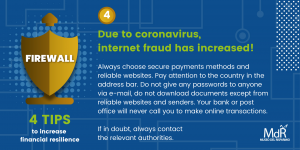The pandemic has forced us to stay at home for a long time and to change some of our habits, and caused an unprecedented economic shock. According to ISTAT, the Bank of Italy, the OECD and the International Monetary Fund, a marked drop in GDP will be registered in 2020 and in the best scenario the economy will recover only in 2021.
To help people face the problems this situation brings, the Museum of Saving has created FIREWALL, four little bits of advice to increase financial resilience or the ability to withstand the impact of the crisis without falling into despair.
Useful tips already before, but now even more important. The reduction of revenue, job loss and growth of online shopping require greater attention to proper money management.
When budget constraints are tight, planning economic and financial decisions is not only a good rule, but a necessity. Without acting as if nothing is amiss or isolating, but trying to be realistic, identifying the available opportunities and asking for help when necessary.
However, we should not lose sight of our desires and goals. Even if it is now impossible to achieve them, we will patiently wait for a better future having one more reason to look forward with confidence.
TRACK YOUR EXPENSES! (TIP 1)

IF YOU HAVE DEBTS, REMEMBER TO EVALUATE WHAT TO PAY FIRST! (TIP 2)

IF YOU HAVE NEVER DONE, START TO PLAN! (TIP 3)

DUE TO CORONAVIRUS, INTERNET FRAUD HAS INCREASED (TIP 4)

FOCUS: HOW TO PREVENT INTERNET FRAUD
SHOP on official sites, avoiding those appearing less reliable: verify the URL begins with HTTPS (and the symbol of a closed padlock), and make sure that the legal data are indicated (the registered office located in a “tax haven” should be a wake-up call) and the contact information is available (better if there are active social profiles with reviews). If in doubt, consult the most popular search engines for a check.
PAY using cash on delivery or bank transfer, if allowed, or a prepaid card recharged with the exact amount necessary for the purchase; use the credit card only after having generated a disposable virtual card for an amount not exceeding the sum due.
Never transmit the data of your cards outside the specific payment procedures, and never provide the details of your bank account or identity documents. Do not communicate them verbally, and do not write them by text message or e-mail, even when they seem to arrive from institutional websites, such as a bank: in fact, your bank or post office already has the information they need, while other banks are not entitled to ask you.
Be wary of e-mails where unknown senders offer profitable deals.
Do not open links and do not download documents without the absolute certainty that they come from reliable sources, to avoid the risk that your computer is infected with malware.
If in doubt, always contact the relevant authorities!
